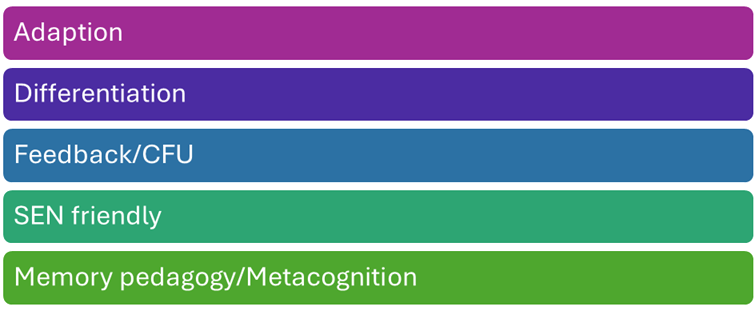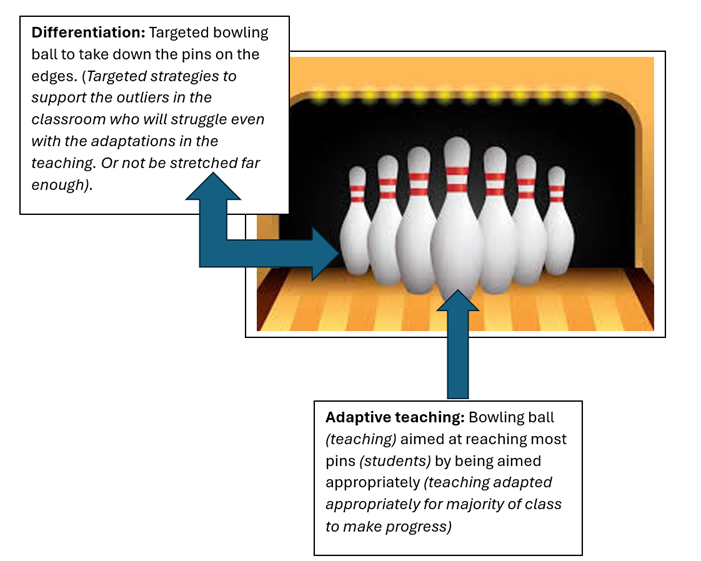September Blog 2025
The Crookhorn Non- Negotiables
Welcome back to the new academic year and I want to start off by thanking each and every one of you for the efforts you put into your classes last year. As you will undoubtedly remember from the fascinating and stimulating data talk I gave (!), the results show an upward trend of GCSE results at the College, which means we must be doing alright!
You will also remember Sarah describing the ‘non-negotiables’ when it comes to our standards when teaching our day-to-day lessons. You will see these below.

Let’s start with adaption and differentiation as our first non-negotiable. We expect all teachers to be able to consider how to implement these two strands of teaching into their daily practice. This will be done in liaison with your coach. Adaptation is where you adapt the learning for all the learners in your class. Differentiation is where you have to have specific strategies in place to support those who might be progress outliers in your class, either because of cognitive barriers or because of attendance or behavioural issues.
Adaptive= is adapting the curriculum or the lesson resources for the whole class (can be where you adjust a teaching resource to fit with how your class learns best, can be revisiting certain areas of information to allow for strong recall, can be dropping some tasks out or adding some tasks in.)
Differentiation= targeted support in the classroom (can be the order in which you live mark, can be a coaching table, can be how the TA supports in the classroom, can be a different level of depth to what other students in the class might be reaching, can be different resources or different exercises)
I think the bowling ball graphic best helps us understand the difference.

Also connected to differentiation is the role of the TA in your classroom. If you have a TA supporting you with a class this provides a great opportunity for differentiation to be taken to a different level. In this vision, within the teacher section it clearly outlines that the teacher should be actively working to support the lowest attainers in the classroom (differentiation), along with live marking to give dynamic feedback to these same students (differentiation). The TA is deployed to support and assist the learning, by checking on the progress of other students in the classroom and feeding back to the teacher where there might be gaps in understanding, thereby enabling the teacher to adapt the lesson to ensure the correct reteach of material that has not been properly understood in depth by the class.
Let’s move onto CFU and feedback, which are obviously linked. We have worked hard on these two strands over the last 10 years, but I want to remind all teachers what we have agreed as our policy.
Feedback and Marking
- Feedback every two weeks in core lessons and every three weeks in foundation lessons.
- This should include at least one piece of student work marked, with formative feedback to help the student improve that piece of work. Question-based feedback is recommended.
- Students should respond, and the teacher should check this.
- Mark for literacy when you do this.
- Use live marking where possible. This is so beneficial for you and your students - and if you are not doing it yet please speak to your coach!
CFU
Checking for understanding is essential because it ensures that communication is truly effective—not just delivered, but received and internalised. Whether in a classroom, workplace, or everyday conversation, it helps identify gaps in knowledge, clarify misconceptions, and reinforce learning. When we pause to confirm understanding, we foster active engagement and create space for questions, reflection, and deeper thinking. It’s not just about making sure someone “gets it”—it’s about building trust, encouraging dialogue, and empowering others to take ownership of their learning or responsibilities. Without it, we risk assumptions, confusion, and missed opportunities for progress.
There are some recommended ways we encourage teachers to CFU and here are just a few.
- Think-Pair-Share: Students reflect on a question, discuss with a partner, then share with the class. It encourages deeper thinking and peer learning
- Exit Tickets: At the end of a lesson, students write a quick response to a prompt or question. It’s a fast way to gauge comprehension and adjust your next lesson accordingly
- Mini whiteboards: One of the most powerful yet simple tools for checking understanding in the classroom. They turn passive learning into active engagement and give teachers a real-time snapshot of every student’s thinking—all without the pressure of formal assessment.
SEN friendly classroom
We know one of our key priorities is to make sure every student feels safe and included in our classrooms. We have done lots of training on how this can be done, but let’s recap some of them below.
- Inclusive Environment & Layout – including seating plan consideration. Pods help facilitate group discussions. Flexible Seating is also encouraged. Clear Pathways to help any students with mobility issues.
- Visual & Sensory Support – Use picture-based timetables and task lists to reduce anxiety and support routine.
- Chunked Instructions
- Assistive Technology – especially how we allow students to use their own device
- Positive Reinforcement
- Accessible Resources
Memory Pedagogy/Metacognition
Memory pedagogy is vital because it bridges the gap between short-term engagement and long-term learning. At its core, it focuses on how students encode, store, and retrieve information—ensuring that what’s taught isn’t just temporarily understood but deeply retained and applied over time. By leveraging strategies like retrieval practice, spaced repetition, and elaboration, memory-focused teaching helps combat the natural forgetting curve and strengthens neural connections that support durable learning. It also empowers students to build cognitive resilience, making it easier for them to transfer knowledge across subjects and real-world scenarios.
We expect this to be done in a number of ways, namely through our homework programme. This is the week by week revision tasks for all year groups (Y11 and Y10E) and then in the preparation for the 3 main assessment points for the rest of the year group. Parts of your lessons will also have this planned into, such as a starter.
Let’s keep the momentum going. These non-negotiable aren’t just expectations—they’re the foundation of the culture we’re building together. Let’s make this year our best yet.
